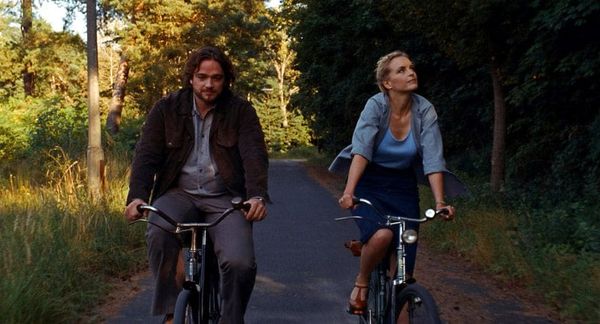Eye For Film >> Movies >> Barbara (2012) Film Review
Barbara
Reviewed by: Owen Van Spall

From the start, Barbara shows us a Cold War era East Germany we rarely see on screen - a land of sunshine and rolling fields, no checkpoints or soviet-type uniforms. It is summer in East Germany, and as the film opens we see Doctor Barbara Wolff (Nina Hoss) arrive in a small, picturesque rural town to start her new posting at the local hospital. The politics of the place and time are not far off, even in this quiet idyll, however. Barbara is here, we soon learn, because she has submitted an application to emigrate to the West and has incurred the wrath of the authorities who are keen to prevent a brain-drain. In the West she hopes to to join her lover, Jörg, who is is busy planning her escape via the Baltic Sea. The two have so far only enjoyed snatched moments together in between smuggling trips: Barbara smuggling her savings out, and taking back into the GDR delights such as finely wrapped West German cigarettes.
Barbara appears severe, with a presumed Berliner's arrogance, to her new hospital colleagues. Her new flat, the neighbours, summer and the countryside hold no charms for her given she expects to be fleeing from the place before long. Behind the local rural charms, the threat of surveillance is everywhere and in everything, and with a touch of brutal medical irony Barbara finds herself subjected to body-probing examinations herself by GDR agents regularly.

She is professional and surprisingly tender to her patients from day one, impressing her peers, but her new boss André worries her. Andre, impossibly mellow, good looking and smart in a low-key way (Ronald Zehrfeld puts in a quietly effective performance, though he looks like a bit like a “surfer dude”) seems to have infinite patience and confidence in Barbara. The two grow closer as they work together both with young patient Stella (Jasna Fritzi Bauer), a girl who repeatedly flees work details, and Mario, an attempted suicide case with possible brain damage.
Yet André also seems too observant, too good to be true. Surely a doctor of his talents should be elsewhere? Has he been assigned to spy on her? As Barbara's deadline to flee to the West approaches, she faces the dilemma right at the center of the triangle of duty, attraction and a desire for freedom.
Director Christian Petzold has stated that he didn't want to take the easy route of showing East Germany as an oppressed and run-down dump, contrasted with a glorious vision of freedom int the West. He didn't want symbols. Instead, in preparation he watched films like To Have And Have Not, where characters have to interact and explore each other while confined under surveillance, perhaps even being ignited in some way by the danger. He wanted to experiment with how circumstances can produce new types of people who have to learn to speak differently.
Here the East German but Soviet dominated environment with its political charge is ever-present but not overwhelmingly in one shade. There are small details: the run down cars and cramped formica apartments, the finer brands of Western cigarettes that immediately stand out to an East-sider, comments here and there about out-of-date medical equipment. The atmosphere is tangibly thick with suspicion, but also humour, warmth and pathos. There is a beauty but also a loneliness to the surroundings. Director Petzold said in his statement that he wanted to capture on film the “specific space between people with everything that has built up, everything that had made them so mistrustful, everything they trust, reject and accept”.
Add to this rich atmosphere some low-key but effective performances, particularly from Zerfheld (who nicely keeps you guessing as to Andre's loyalties) and long-time Petzold collaborator Hoss, and Barbara ends up being a quietly enjoyable film with a sense of the old-fashioned about it and a few bursts of humour to cut through the air of melancholy and suspicion. Though set in 1980, you can easily imagine it taking place and being shot the 1940s. Those viewings of To Have And Have Not must have paid off.
Reviewed on: 11 Feb 2012


















